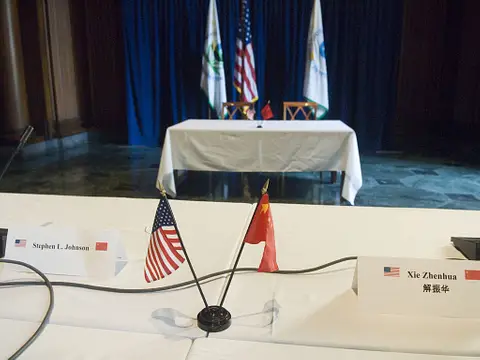It has become increasingly apparent that any notion of U.S. “strategic ambiguity” with respect to Taiwan is dead. Both the Joe Biden administration’s rhetoric and U.S. military deployments in the western Pacific indicate that the United States will come to Taiwan’s defense if the People’s Republic of China (PRC) uses force against the island. The logic underlying this more confrontational stance is that it will deter Beijing from taking rash actions. It is far more likely to produce a potentially catastrophic military collision between the United States and China.
The reliability and credibility of any U.S. security assurances to Taipei are based on the assumption that U.S. forces would prevail if fighting broke out. However, it is most unclear whether that would be the case. Simulations run by the Pentagon and think tanks in recent years have produced mixed results. Some of them indicate that the United States would lose such a war; others point to a hard-fought U.S. victory. Both scenarios entail a horrific cost in lives and treasure. Looming in the background is the worry that either country might conclude that an escalation to the use of nuclear weapons was necessary to avoid a humiliating defeat.
The Pentagon and its supporters increasingly focus on ways to strengthen the U.S. military presence in the western Pacific to maximize the credibility of deterrence. A recent article by Rear Admiral Mark Montgomery (ret.) and Bradley Bowman is typical. They recommend five steps to prevent defeat: enhancing the ability to strike attacking PRC forces; strengthening Taiwan’s ability to defend itself; bolstering the survivability of forward deployed U.S. units; improving the capabilities of U.S. and allied forces to fight together; and building more cyber resilient infrastructure to support military mobility.
Such analyses focus on only one element of deterrence—the balance of military forces. Even with that narrow focus, U.S. prospects are not bright. Over the past two decades, the PRC has dedicated itself to an extraordinarily ambitious military modernization program. The focus of that effort has been on air and naval weapons systems that would make a U.S. intervention to defend Taiwan prohibitively problematic and costly. Beijing may already have achieved that capability. If not, it is just a few years away.
Montgomery and Bowman implicitly acknowledge one of the other elements of deterrence, location of the battlefield, and they concede that the United States would be at a severe disadvantage by that standard as well. The task is inherently difficult “because the United States is trying to deter conflict in areas within 100 miles of Chinese ports and airfields, but 8,000 miles from the U.S. West Coast.” Indeed, prevailing against a first-class military power (and the PRC is now that) in its strategic backyard probably is not attainable no matter what effort is made.
Another crucial consideration with respect to deterrence credibility is how important the issue at stake is to the contending powers. China holds the edge on that basis as well. Taiwan is not a trivial interest to the United States the way Ukraine is (or at least should have been). Unlike corrupt, authoritarian Ukraine, Taiwan is a liberal democracy that has legitimately attracted the admiration of the American people. The island also is a significant player in the global economy, most notably by being the top producer of advanced computer microchips. U.S. and other western leaders understandably do not want Taiwan to come under the PRC’s control.
However, as important as Taiwan may be to the United States and its allies, it is even more important to China. To Chinese leaders and much of the mainland population, Taiwan is the last major symbol of China’s “century of humiliation” when outside powers seized Chinese territory and treated the Middle Kingdom as a third-rate power. Regaining sovereignty over the island is important to the PRC from an economic standpoint, but the island’s importance to Beijing goes far beyond that consideration. Chinese recall General Douglas MacArthur’s boast that Taiwan was America’s “unsinkable aircraft carrier,” and they note the numerous signs that Washington continues to view Taiwan as the keystone in the first island chain to stifle Beijing’s air and naval force-projection capabilities. Add the emotional, patriotic sentiment to the more substantive aspects, and it is clear that regaining Taiwan is an extremely high-priority to China.
Countries typically choose to fight to defend vital interests, regardless of the risks, costs, or prospects for success. The United States has repeatedly miscalculated with respect to that aspect of deterrence. President Franklin Roosevelt’s administration backed Imperial Japan into a corner regarding its economic survival and the preservation of Tokyo’s China policy. Japanese leaders chose war rather than capitulation, even though some of them, including Admiral Isoroku Yamamoto, the architect of the attack on Pearl Harbor, suspected that their country could not win a war against the United States.
More recently, U.S. policymakers ignored repeated warnings from the Russian government that attempting to make Ukraine a NATO member or military asset would cross intolerable red lines as far as Russia’s security was concerned. We are witnessing the ongoing tragic consequences of that deterrence failure. Ukraine was a vital Russian interest, and Russian leaders were willing to fight a war over the issue.
U.S. policymakers seem to be blundering down a similar path with respect to the PRC and Taiwan. They need to realize that deterrence is not likely to work in this case. A commitment to defend Taiwan means that the American people must be willing to fight a full-scale war with China in the PRC’s immediate neighborhood. The cost in blood and treasure would be massive, and the prospects for even a highly tainted “victory” not good.








